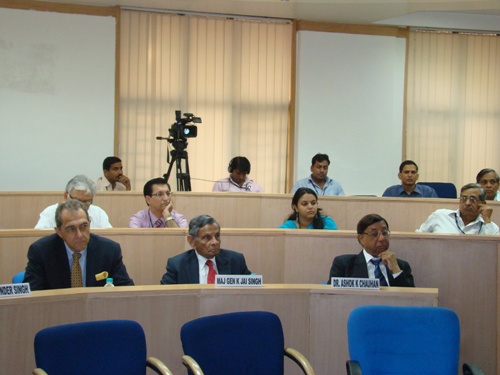28 Sep 2011|Noida | Amity University Campus, Sector-125 Noida
Dr. Manas Mandal- Director, Defense Institute of Psychological Research delivers lecture at Amity University

Dr. Manas Mandal- Director, Defense Institute of Psychological Research and an eminent Military Psychologist delivered an interesting lecture on the topic "Managing Crowd & Mass Panic" at Amity University, Sector- 125, Noida.
Starting the lecture by elaborating the term “ Behaviometrics”, Dr. Mandal said that Behaviometrics refers to biometric equivalent of subject’s behavioral traits to recognize or verify the identity of the person. It includes the study of behavioral patterns rather than just physical attributes. Behaviometrics helps in measuring human behavior (or semi behavior) in order to verify the identity of a person in a crowd through techniques such as “Long Range Face Recognition System”, “Gait Analysis Program” and “Multi- model Fusion Algorithm for Human Identification”.
Talking about crowd and crowd behavior, Dr. Mandal said that India is a country with 1.2 billion population, anywhere one goes, he finds masses. Therefore, there is a high possibility of mass breakdown in the form of stampede, riots, mob fury, etc. “Crowd is always influenced by suggestions and emotions rather than by reason, for crowd emotions come first and reason comes later as a result of which, a crowd can always turn into mob. Mob has no concern about law and authority and generally leads to violence and destruction of public property. The person in crowd is not guilty of his behavior or action whereas when he alone violates law and order, his inner consciousness pricks him and feels the guilt of his unruly behavior,” remarked the speaker.
Further corroborating his viewpoint, Dr. Mandal said that unlike generally believed, the covert impact of panic (secondary traumatization) is much more than the overt impact (primary traumatization). The terror of the panic effects the people associated with the victims more than the victims.
Dwelling on the stages leading to Mass Panic, Dr. Mandal shared that an unforeseen event can result in uncertainty and ambiguity which affects the logical decision making of the individuals. In such a sensitive condition, collective anxiety heightens leading to outbreak of mass panic.
Highlighting the psychological guidelines to follow during the outbreak of Mass Panic, Dr. Manas Mandal suggested that during mass panic, any kind of excitement should be minimized which can further flare up the panic, sight of panic and trauma should be cordoned off, avoid media framing by imparting input in collective forum, caregivers should refrain from critical decision making, statements with carefully drawn lexicons and factual information should only be shared, reassurance should be given in public forum before the panic peaks and importance of communication should be emphasized.
The speaker shared the details of several stampedes that took place in India and shook the entire nation including Naina Devi Temple Stampede in Himachal Pradesh (2008), Chamunda Devi Temple Stampede in Jodhpur (2008) and Sabarimala Temple stampede in Kerala (2010).
Dr. Mandal also explained “ Mass Hysteria: Covert Panic”, its causes and psychological symptoms by citing incidences of Mass Hysteria in India including Drinking Milk by Lord Ganesha, Monkey Man in New Delhi, Face Scratcher in UP etc.
Suggesting support technology for crowd control, Dr. Manas Mandal remarked that there are several techniques which can be adopted to mitigate the effects of crowd gone haywire including the knowledge and adequate arrangements for Horizontal Pushing and Vertical Stacking of the crowd, Use of long range acoustic device for communication, Standardised lexical structure of command, Automating the delivery of command and Countering socially engineered rumor.
Dr. Ashok K Chauhan- Founder President, Amity Group thanked the prolific speaker to explain the nuances of "Managing Crowd & Mass Panic" with profundity of thought. In order to develop the science of “ Behaviometrics” which is in the nascent stage in the country and developing a pool of Behaviometric scientists who can assist in reading the behavioral patterns of the individuals especially criminals , Dr. Chauhan announced to start a certificate course in “Behaviometrics” for students and faculty members.
Prof. S Sitaraman delivered the vote of thanks.
The lecture was attended by senior members of Management, Directors, Head of the Institutions and Faculty members of Amity including Mr. K S Bains- Director General, Amity Institute of Training and Development, Mr. R P Singh (IPS) Retd.- Director General , Amity Institute of Training and Development for Police and Security Personnel, Dr. Alka Munjal- Director, Amity School of Business and Director, Academics and others